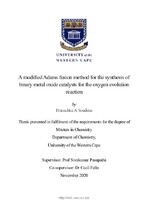| dc.contributor.advisor | Pasupathi, Sivakumar | |
| dc.contributor.author | Soudens, Franschke A | |
| dc.date.accessioned | 2021-04-22T11:54:04Z | |
| dc.date.available | 2021-04-22T11:54:04Z | |
| dc.date.issued | 2020 | |
| dc.identifier.uri | http://hdl.handle.net/11394/8231 | |
| dc.description | >Magister Scientiae - MSc | en_US |
| dc.description.abstract | The majority of the global energy is sourced from conventional fossil fuels. The high demand for energy is accelerating along with the depletion of these fossil fuels. Hence, the shift to renewable energy sources and technology becomes indispensable. Hydrogen is considered a promising alternative to fossil fuels. Polymer electrolyte membrane water electrolysers offer an environmentally friendly technique for the production of hydrogen from renewable energy sources. However, the high overpotential and acidic environment at the anode is one of the challenges faced by polymer electrolyte membrane water electrolysers. This harsh environment requires distinct electrocatalysts which currently consist of expensive precious metals such as Ir, Ru and their oxides. | en_US |
| dc.language.iso | en | en_US |
| dc.publisher | University of Western Cape | en_US |
| dc.subject | Adams fusion method | en_US |
| dc.subject | Binary metal oxide | en_US |
| dc.subject | Oxygen evolution | en_US |
| dc.subject | Energy | en_US |
| dc.subject | Fossil fuels | en_US |
| dc.title | A modified Adams fusion method for the synthesis of binary metal oxide catalysts for the oxygen evolution reaction | en_US |
| dc.rights.holder | University of Western Cape | en_US |

